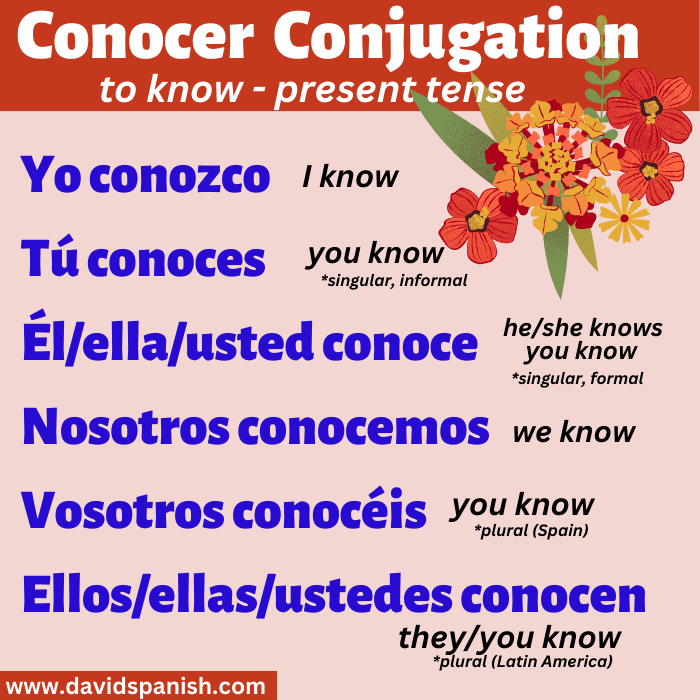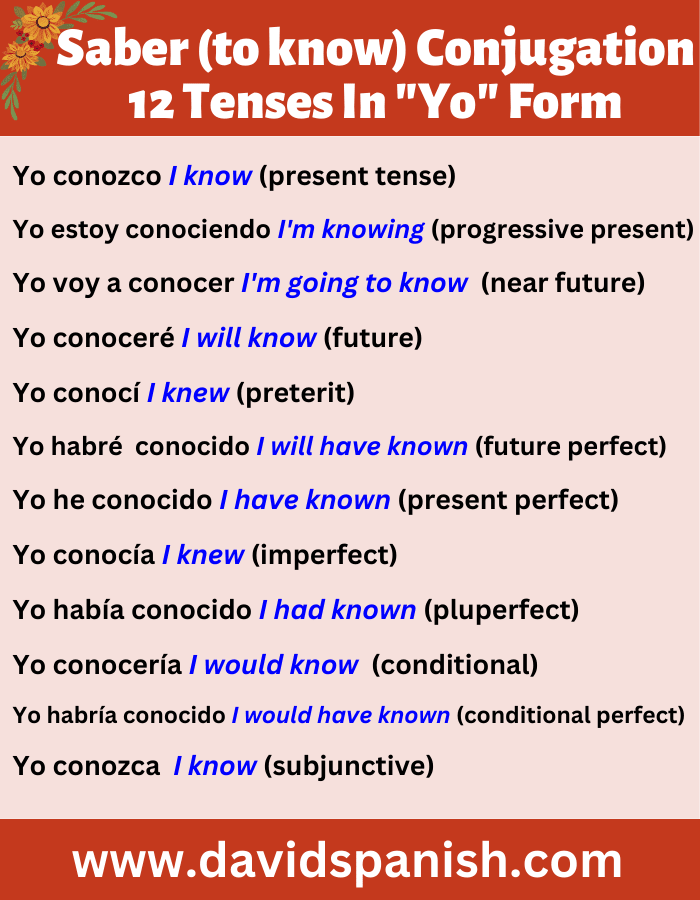The Spanish verb conocer translates to “to know”, in the context of knowing people and places. The conjugation of conocer in the present tense is: Yo conozco (I know), tú conoces (you know), él/ella, usted conoce (he/she knows, you know), nosotros conocemos (we know), vosotros conocéis (you now) and ellos/ellas/ustedes conocen (they/you know).

Conocer is an irregular ER verb. While its endings are the same as all other regular ER verbs when conjugated in the present tense, it has a stem change in the first-person singular (yo) form. This page on our site covers regular and irregular Spanish ER verbs in detail.
Further down the page, we cover conjugation charts with example sentences for conocer in the following six commonly used Spanish verb tenses:
- Present tense (el presente de indicativo)
- Near future tense (futuro proximo)
- Future tense (el futuro)
- Preterite (el préterito)
- Past indefinite (el perfect de indicativo)
- Present subjunctive (presente de subjuntivo)
Conocer conjugated in the present tense

Conocer means to know in the context of knowing people, places and areas of study. For example, Yo conozco a Juan (I know Juan) or Yo conozco Madrid (I know Madrid).
The verb saber, however, means to know in the context of knowing facts. This page on our site offers complete conjugation charts for saber with example sentences.
Conocer conjugation table

The following graphic shows conocer conjugated in twelve tenses in the first-person singular (yo) form.

Conocer conjugation charts
Present tense (el presente de indicativo)
In the present tense, yo conozco means “I know”. The is followed by the preposition a then the person. For example, Yo conozco á Maria.
| yo conozco | I know | Yo conozco a tu hermana. | I know your sister. |
| tú conoces | you know | ¿Conoces a mi tío? | Do you know my uncle? |
| él/ella, usted conoce | he/she knows, you know | Conoce muy bien la Ciudad Juárez. | He knows Juarez very well. |
| nosotros conocemos | we know | Conocemos a su jefe. | We know your boss. |
| vosotros conocéis | you know | ¿Por qué no conocéis Madrid? | Why aren't you familiar with Madrid? |
| ellos/ellas, ustedes conocen | they/you know | Conocen a las personas influyentes. | They know the influential people. |
Near future tense (futuro proximo)
In the near future tense, yo voy a conocer translates to “I’m going to know” or “I’m going to meet”.
| yo voy a conocer | I am going to know | Voy a conocer a tu amigo. | I'm going to meet your friend. |
| tú vas a conocer | you are going to know | Vas a conocer el éxito. | You're going to know success. |
| él/ella, usted va a conocer | he/she/you is (are) going to know | Va a conocer a sus amigos nuevos. | He's going to meet his new friends. |
| nosotros vamos a conocer | we are going to know | Vamos a conocer la felicidad. | We're going to know happiness. |
| vosotros vais a conocer | you are going to know | Vais a conocer Montevideo. | You're going to know Montevideo. |
| ellos/ellas, ustedes van a conocer | they/you are going to know | Van a conocer a sus familiares lejanos. | They're going to meet their distant relatives. |
Future tense (el futuro)
In the future tense, yo conoceré translates to “I will know”.
| yo conoceré | I will meet | Yo conoceré a muchos amigos nuevos a México. | I'll meet lots of new friends in Mexico. |
| tú conocerás | you will meet | Tú conocerás a tu esposa este año. | You'll meet your wife this year. |
| él/ella, usted conocerá | he/she/you will meet | Él conocerá a su novio en una cantina. | He'll meet his girlfriend in a bar. |
| nosotros conoceremos | we will meet | Conoceremos el éxito este mes. | We'll know success this month. |
| vosotros conoceréis | you will meet | Conoceréis todas la ciudades importantes de Europa. | You'll know all the important cities in Europe. |
| ellos/ellas, ustedes conocerán | they will meet | Conocerán el norte de Méxicio. | They'll know the north of Mexico. |
Preterite (el préterito)
The preterite is a commonly used Spanish past tense used to express past actions which occurred at specific times. Yo conocí translates to both “I knew” and “I met”.
| yo conocí | I knew (also met) | Conocí mi esposa en la universidad. | I met my wife in university. |
| tú conociste | you knew | ¿Cómo conociste tu mejor amigo? | How did you meet your best friend? |
| él/ellas usted conoció | he/she/you knew | Él conoció a sus padres biologicos. | He met his biological parents. |
| nosotros conocimos | we knew | Nos conocimos desde hace un año. | We met each other one year ago. |
| vosotros conocisteis | you knew | ¿Cómo os conocisteis? | How did you meet each other? |
| ellos/ellas, ustedes conocieron | they/you knew | Conocieron a sus primos lejanos en la reunión familiar. | They met their distant cousins at the family reunion. |
Past indefinite (el perfect de indicativo)
The past indefinite tense is used to express past action which have a bearing on the present. Yo he conocido translate to “I have known”.
| yo he conocido | I have known | He conocido a Pablo desde hace mucho tiempo. | I've known Pablo for a long time. |
| tú has conocido | you have known | Has conocido a María desde hace un mes. | You've known Maria for one month. |
| él/ella, usted ha conocido | he/she/you have (has) known | Ha conocido a su esposa desde hace veinte años. | You've known your wife for twenty years. |
| nosotros hemos conocido | we have known | Nos hemos conocido desde hace tres décadas. | We've known each other for three decades. |
| vosotros habéis conocido | you have known | Habéis conocido a Joaquín desde hace una semana. | You've known Joaquín for one week. |
| ellos/ellas, ustedes han conocido | they have known | Han conocido a sus amigos desde hace seis meses. | They've known their friends for six months. |
Present subjunctive (presente de subjuntivo)
The subjunctive mood is used to express wishes, emotions and doubts. Yo conozca translates to “I know”.
| yo conozca | I know | Es importante que conozca a mis vecinos. | It's important that I know my neighbors. |
| tú conozcas | you know | Quiero que conozcas a mi tío. | I want you to meet my uncle. |
| él/ella, usted conozca | He/she knows, you know | Dudo que conozca al presidente municipal. | I doubt he knows the mayor. |
| nosotros conozcamos | we know | Quiere que conozcamos a los recién llegados. | He wants us to meet the newcomers. |
| vosotros conozcáis | you know | Estoy feliz que conozcáis a la estrella de cine. | I'm happy you know the movie star. |
| ellos/ellas ustedes conozcan | they/you know | Es necesario que conozcan a los autoridades. | It's necessary that that meet the authorities. |
Discover more:
- Ser Conjugation: How to Conjugate “To Be” in Spanish
- Estar Conjugation in Spanish
- Querer Conjugation: How To Conjugate To Want In Spanish
- Poder Conjugation: How to Conjugate Can, Be Able In Spanish
- La Bamba Meaning, Spanish Lyrics & English Translation - May 4, 2024
- Bésame Mucho Meaning, Spanish Lyrics & English Translation - May 3, 2024
- Querida – Lyrics, Meaning & Translation - May 2, 2024
